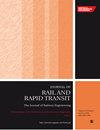通过更安全、更高效的重载作业激励脱碳
IF 2.1
4区 工程技术
Q3 ENGINEERING, CIVIL
Proceedings of the Institution of Mechanical Engineers Part F-Journal of Rail and Rapid Transit
Pub Date : 2023-04-18
DOI:10.1177/09544097231169420
引用次数: 0
摘要
从环境的角度来看待部件使用寿命和铁路服务可靠性的提高。由于燃料消耗增加和需要过早更换重型设备,延误和火车事故带来巨大的成本和温室气体(GHG)排放潜力。介绍了加拿大铁路使用高性能材料、更高效的车辆设计和现代技术来减少服务中断。由此产生的成本节约不仅可以为资产利用的持续优化提供财政激励,而且还可以为铁路行业的脱碳做出重大贡献。作者估计,与2017年一级铁路相比,由于轮对寿命的延长,每年可减少2.4 kt-CO2e的具体碳排放。在全系统范围内,与2017年相比,铁路寿命的延长每年节省了8.1 kt- co2当量。与2004年相比,加拿大铁路行业每年因减少干线脱轨而减少了6.7 Mt-CO2e的隐含碳排放量。本文章由计算机程序翻译,如有差异,请以英文原文为准。
Incentivized decarbonization through safer and more efficient heavy haul operations
The improvement in component service life and railway service reliability has been viewed from an environmental perspective. Delays and train accidents carry enormous costs and greenhouse gas (GHG) emissions potential due to the increased fuel burn and the need to replace heavy equipment prematurely. The use of higher-performance materials, more efficient vehicle design, and modern technology by Canadian railways to reduce service interruptions are presented. Their resulting cost savings not only can provide financial incentives for the continuous optimization of asset utilization but can also lead to significant contributions to the decarbonization of the railway industry. The authors have estimated a total reduction of 2.4 kt-CO2e per year in embodies carbon emissions due to life extensions of wheelsets compared to 2017 levels on a Class 1 railway. System-wide, the rail life extension has resulted in a saving of 8.1 kt-CO2e per year compared to 2017 for the same railway. Compared to 2004, the Canadian railway industry has achieved an annual reduction in embodied carbon emission of 6.7 Mt-CO2e from the reduction in mainline derailments.
求助全文
通过发布文献求助,成功后即可免费获取论文全文。
去求助
来源期刊

CiteScore
4.80
自引率
10.00%
发文量
91
审稿时长
7 months
期刊介绍:
The Journal of Rail and Rapid Transit is devoted to engineering in its widest interpretation applicable to rail and rapid transit. The Journal aims to promote sharing of technical knowledge, ideas and experience between engineers and researchers working in the railway field.
 求助内容:
求助内容: 应助结果提醒方式:
应助结果提醒方式:


